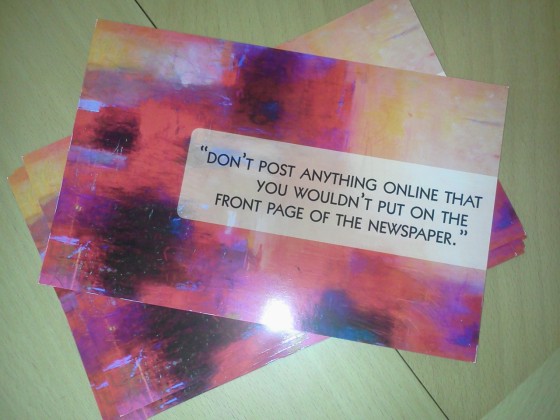It’s back to school time and most parents are rejoicing that their little angels are going to be at school 6-8 hours a day for the next 9 months. They’re going to be spending a lot more time than their peer group than during the summer so it might be a good time to review your family’s rules regarding where and how they spend their time online.
I know a lot of parents are concerned about cyberbullying – from a victim and perpetrator perspective. Here are my tips to help parents prevent their child from being involved in a cyberbullying situation.
1. Wherever your children are active online, you need to be there too.
Whatever social media sites your kids are using, you need to have an account and be connected to them, to at least be aware of how and to whom they are communicating. There should be a clear expectation that they can’t create a profile on a site or add an app to their phone without your permission.
2. Address behavior where your child may be bullying others or being bullied.
Have high expectations for your child’s behavior. They can have fun with their friends, but it shouldn’t cross the line into being cruel. You don’t want them to develop the habit of shooting their mouth off whenever they want online.
Likewise, be understanding and empathetic if your child is being targeted by their peers for being different. Support them and don’t ignore it. Work with them to decide the best way to deal with it.
3. Educate your children about communicating with strangers online.
Each family is free to set their own rules, but in general, I don’t recommend that parents allow their children to form relationships with people online that they don’t know in real life.
4. Educate your children about the potential effects of every post.
Once a post is out there, you can never fully take it back. It will always be on a server somewhere. Even if the original post is deleted, you have no control over whether others took a screenshot or shared it with others before it was deleted. My rule of thumb is never post anything online that you wouldn’t put on the front page of the newspaper. The same idea should apply to sending text messages and taking pictures with your phone.
5. Know how to access your child’s cell phone.
I generally support respecting your children’s privacy but parents should be able to check their child’s text messages, pictures, and apps if a situation warrants it.
6. Cut off the bully’s access to your child.
There are ways to block users and report abusive people on every social media site that I know of. One of the best ways to help a child begin to feel better is to cut off the bully’s ability to communicate with them. If they’re being bullied via text message, consider changing their number.
7. If your child is being abused, report it to the appropriate social media forum, email provider, or cell phone service provider.
The terms of service have rules against using their forum to harass others and a social media site has the authority to suspend an abusive person’s account if they think it’s necessary.
8. Keep a record of the abuse.
There are times it makes sense to pursue a civil lawsuit or get law enforcement involved. If you do that, you will have to prove that the harassment occurred. A court can be sympathetic to your story, but they cannot punish the wrongdoer without sufficient evidence. Take screenshots of abusive posts on social media sites and don’t delete the abusive emails or text messages.
If you prefer to hear me talk about this topic, I made a video of cyberbullying tips for parents.
If you want more information about the legalities of social media, please check out my book The Legal Side of Blogging: How Not to get Sued, Fired, Arrested, or Killed. If you need information or advice about a situation involving your child, please contact a social media attorney in your community.
You can connect with me on Twitter, Google+, Facebook, YouTube, LinkedIn, or you can email me.
You can also subscribe to the Carter Law Firm newsletter.
Please visit my homepage for more information about Carter Law Firm.


